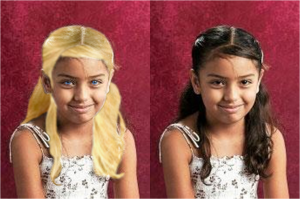How do we create a “missing ethnic girl” syndrome and inject it into American media?
Guest Editorial:

Question for the media: If Brisenia Flores looked like the photo on the left, versus her real self on the right, would have you done justice by her story? Would it have been newsworthy enough?
I wonder what nine-year old Brisenia Flores would have thought of Sonia Sotomayor. I wonder if she would have been inspired by her; dreamt about being like her; and found the strength to arise from impoverished circumstances to, one day, have millions rally in support of her (and against her), just like the Bronx native.
We’ll never know.
That’s because Brisenia is dead. Shot in the head, along with her father, during a home raid by members of the Minutemen American Defense (MAD). She was shot through her left cheek.
But every war has casualties, right? The Minutemen – patriotic Americans – were justified in raiding Brisenia’s home to secure United States borders and coastal boundaries against unlawful and unauthorized entry of all individuals, contraband, and foreign military.
Never mind all this happened ten miles north of the border in the United States of America, so despite committing the monstrous and inhumane act of shooting a child in her own bed, they seemed to be a little off-course from their self-proclaimed jurisdiction.
You haven’t heard about Brisenia because she wasn’t blond – she was a brunette. She wasn’t white – she was of Mexican descent. She wasn’t Natalee Holloway vacationing in Aruba. She was Brisenia Flores sleeping in her bed in Arivaca, Arizona, which is in the United States (just in case any Minutemen get confused). Last time I checked the cable network Lifetime wasn’t making a movie on Brisenia, like they are on Natalee. All they have in common is that they both have a Wikipedia page.
Nothing against white people, because “many of my friends are white,” (sorry Justin Barrett of the Boston PD) but no one can argue that all of the aforementioned “missing white woman” variables are qualifiers for endless national media attention. Anything opposite constitutes blackout.
Actually, that’s not true.
It took Hurricane Katrina, the costliest hurricane as well as one of the five deadliest, in the history of the United States and thousands of black bodies floating in the streets of New Orleans to eclipse Natalee Holloway. It wasn’t until then, that minorities, “so poor and so black,” who were victims of broken levees and FEMA’s blatant disregard of human survival, were able to get more coverage than they could handle.
If it takes that many minority deaths to break serious coverage on Brisenia, don’t count me in on participating or hoping for that type of tragedy, but you never know, maybe we’ll get lucky and a category five hurricane will hit the predominantly-Hispanic, Rio Grande Valley region of South Texas. After all, the season is upon us.
Of course, Google “Brisenia Flores” and hit the news link and you’ll see countless journalists breaking this May 30th murder in July. I love “real-time” news. Hell, look at me, the Hispanic columnist pot, calling the media kettle black.
But I did it to prove a point. Admittedly, I waited. I held my breath hoping that Brisenia would become the next Hollo-way or Jon Benet Ramsey, but her parents were drug dealers, which diluted the importance of her life and the importance of her death. Ultimately, our victimization as a community isn’t as newsworthy as our instances of victimizing people. Just watch the nightly news and “Cops. ” That’ll prove my point.
I’m back to wondering like I did at the beginning of this column.
I wonder, “If Brisenia was named Brooke, would that have changed things?”
I wonder, “If the Minutemen were an Islamic terrorist group, instead of a homegrown one, and broke into a suburban white picket fenced home, instead of a humble one, would Americans have been spoon-fed the events of that day for months to come?”
I wonder, “If instead of writing about the media’s prejudices and trying to find the formula for the ‘Missing Ethnic Girl’ syndrome, should I be taking this tragedy and writing words that become the seeds of new thinking and change.”
I come to the same answer.
We’ll never know.





